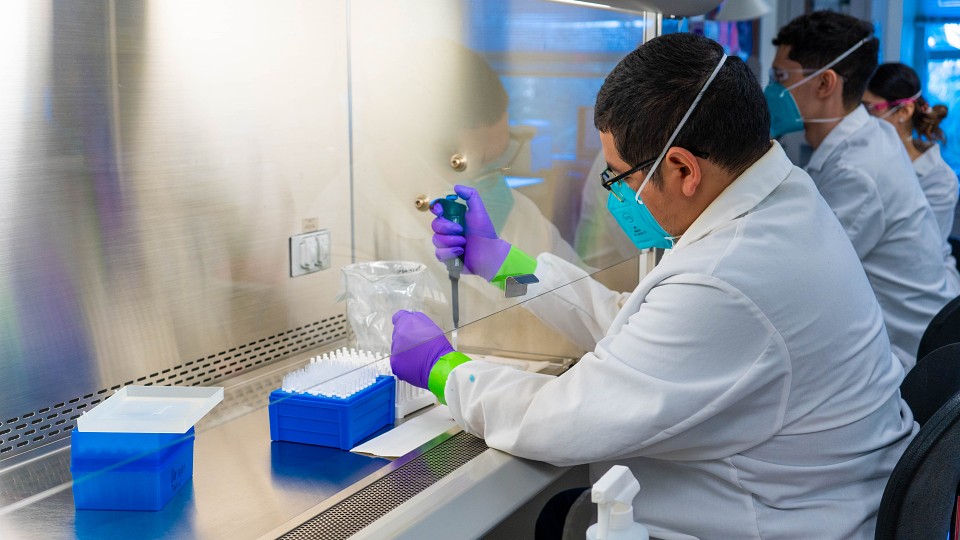By Dimitra Trejo
RIO GRANDE VALLEY, TEXAS – The UT Health RGV Clinical Laboratory this month is expanding as a comprehensive diagnostics lab with a range of testing capabilities well beyond COVID-19 samples.
The expanded lab is designed, in part, to help shorten wait times for laboratory results in the Valley that otherwise would have to be sent out of state. It also expands the kinds of tests it can process.
The lab – since April 2020 and the onset of the pandemic – has provided results for more than 90,000 COVID-19 test swabs and antibody tests for the Valley and the state of Texas.
Now, laboratory staff – a mix of licensed medical technologists, lab technicians and graduate student employees – has expanded from 15 to 25 to meet the area’s need for more complex testing.
Dr. John Thomas, director of the UT Health RGV Clinical Laboratory said the demand for services, including but not exclusively for COVID-19, spurred the expansion of the lab.
“We wanted to expand our services to benefit our university community and the community at large,” Thomas said. “That is how we decided to shift our resources from a research-based lab focused on arbovirus and rickettsial disease surveillance – like Zika, Dengue, West Nile and Lyme disease – to becoming a fully operational diagnostic lab.”
Thomas said that, since the lab began testing COVID-19 and antibody samples, the turnaround time for results is about 24 hours – one of the fastest turnaround times in Texas.
Now, the UT Health RGV Clinical lab will offer more than 200 types of testing services, and is expected to offer patients an in-house testing menu of more than 500 options by the end of the summer.
FILLING THE GAP
The state-of-the-art lab facilities are paired with the resources to culture, manipulate and identify biohazardous agents, Thomas said. Because the lab work is down here at home in the Valley, it reduces the wait time for test results that otherwise would be outsourced to bigger labs around the country.
“Our lab has been conducting comprehensive testing on a number of complex samples for six years already,” Thomas said. “We’ve been ready to take on this load of testing and provide the community with faster turnaround times, so they don’t have to wait so long for results.”
He said sending samples to other states like California takes at least a day for the sample to arrive and another day to be tested.
“Labs all over the United States are using those services, so it overwhelms big labs,” he said. “That means patients will have to wait a longer time for their results.”
The expanded UT Health RGV Clinical Lab is unique in that it uses a complex testing platform purchased initially for research-related diagnostics, Thomas said.
“Our Abbott Alinity I platform to test COVID-19 and antibody samples takes about 20 minutes to execute and has the capacity to run 2,000 samples per day. Because it’s so fast, we are able to process samples for a number of nearby labs, and we are happy to do so.”
BUILDING REPUTATION
The UT Health RGV Clinical Lab will focus on six key sections of testing:
-
- Anatomic pathology.
- Coagulation and urinalysis.
- Clinical microbiology.
- Routine chemical testing.
- Molecular testing.
“We want our community and our contract clients to know we will be delivering advanced testing and case evaluations to bring patients the diagnosis needed to plan the best care,” Thomas said.
The lab will have draw sites in Harlingen, Mercedes and Edinburg, and UT Health RGV couriers will transport the samples to the Clinical Laboratory, which is housed in the UTRGV School of Medicine Research Education Building on the Edinburg Campus.
“We are going to centralize all the testing being conducted at our 25-plus UT Health RGV clinics throughout the Valley through the main lab in Edinburg and streamline the testing process,” Thomas said.
The lab also has established a secure online portal where patients can access some of their results, while other results will be made available to their providers from the same portal.
Michael Patriarca, UTRGV’s senior associate vice president for Health Affairs and executive vice dean for Finance and Administration for the School of Medicine, said the UT Health RGV Clinical Laboratory will increase the university’s clinical footprint in the area and help fulfill its commitment to provide better access to healthcare for the community.
“We will be able to get patients the results they need the next day, while also creating jobs and research opportunities right here in the Valley,” he said.
To view the comprehensive list of testing services available with the UT Health RGV Clinical Laboratory visit https://uthealthrgv.org/clinical-laboratory/.
ABOUT UTRGV
The University of Texas Rio Grande Valley (UTRGV) was created by the Texas Legislature in 2013 as the first major public university of the 21st century in Texas. This transformative initiative provided the opportunity to expand educational opportunities in the Rio Grande Valley, including a new School of Medicine and a School of Podiatry, and made it possible for residents of the region to benefit from the Permanent University Fund – a public endowment contributing support to the University of Texas System and other institutions.
UTRGV has campuses and off-campus research and teaching sites throughout the Rio Grande Valley including Brownsville (formerly The University of Texas at Brownsville campus), Edinburg (formerly The University of Texas-Pan American campus), Harlingen, Weslaco, McAllen, Port Isabel, Rio Grande City and South Padre Island. UTRGV, a comprehensive academic institution, enrolled its first class in the fall of 2015; the School of Medicine welcomed its first class in the summer of 2016, and the School of Podiatric Medicine in the fall of 2022.

